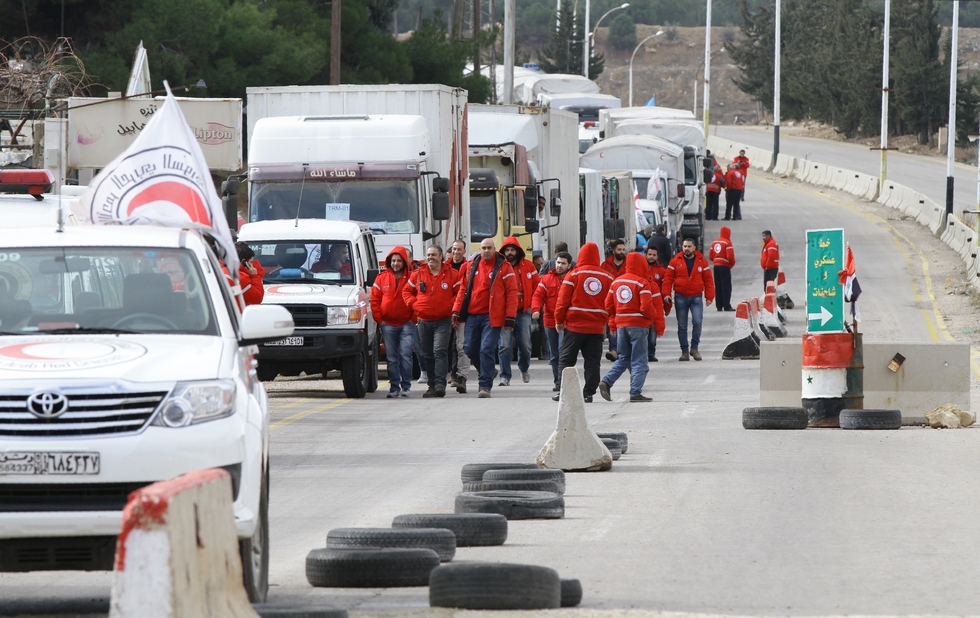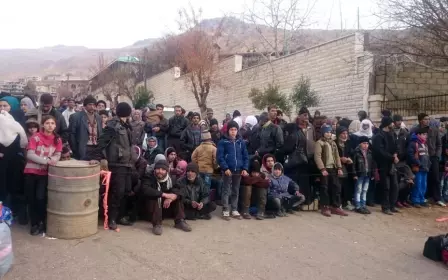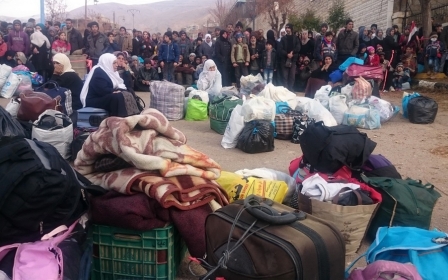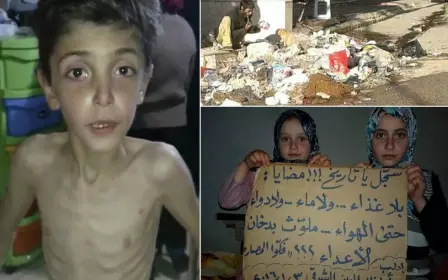New aid convoy enters besieged Syrian town of Madaya

A convoy carrying desperately needed food and medicine entered the hunger-stricken Syrian town of Madaya on Thursday, the second delivery of aid this week after months of government siege.
Six white trucks emblazoned with the logo of the Syrian Arab Red Crescent entered the town late on Thursday afternoon, an AFP reporter said. The United Nations said suffering is the worst to have been seen in Syria's nearly five-year war.
Dozens of additional trucks were waiting on the edges of the town after arriving from Damascus as part of the convoy carrying flour and other foodstuffs, medical supplies, and a range of basic supplies.
The town's 40,000 residents have endured a crippling siege by pro-government forces that has drawn sharp condemnation from the UN and world powers.
UN Secretary-General Ban Ki-moon on Thursday issued his strongest warning to date on the use of sieges as a tactic of war.
"Let me be clear: the use of starvation as a weapon of war is a war crime," Ban told reporters.
"All sides - including the Syrian government which has the primary responsibility to protect Syrians - are committing this and other atrocious acts prohibited under international humanitarian law," he said.
Ban said Syrians living under siege were "being held hostage", but added that their plight was even worse: "Hostages get fed."
"These children and women and men are struggling to survive without food or medicine," he said.
Also on Thursday France, Britain, and the United States requested an emergency UN Security Council meeting to demand the lifting of sieges in Syria and allow aid deliveries to civilians facing starvation.
The meeting is expected to be held on Friday and French Ambassador Francois Delattre said it "will draw the world's attention to the humanitarian tragedy that is unfolding in Madaya and in other towns in Syria".
More than two dozen people have reportedly starved to death in Madaya since December.
A spokesman for the International Committee of the Red Cross said Thursday’s convoy included a total of 44 aid trucks.
"The priority is wheat flour and washing materials," Pawel Krzysiek told AFP.
Medical teams were aboard the trucks and "the ICRC is also bringing a nutritionist for a proper assessment" of residents, he said.
A separate convoy of 17 trucks left the capital for Fuaa and Kafraya, two towns in Syria's northwest that are encircled by rebels, and the aid was to enter all three places simultaneously, Krzysiek added.
'This cannot go on'
According to al-Manar, a station operated by the Lebanese movement Hezbollah that supports the Syrian government, at least three trucks had also entered Fuaa and Kafraya.
Thursday's delivery to Madaya follows one on Monday that was the first humanitarian assistance received by the town in nearly four months.
In a statement on Thursday, the ICRC's top official in Syria, Marianne Gasser, said Madaya's suffering was "heart-breaking".
"People are desperate. Food is in extremely short supply. It is the elderly, women and children who are suffering the most, especially from severe malnourishment... This cannot go on," Gasser said.
The UN's Office for the Coordination of Humanitarian Affairs (OCHA) said a third delivery to the towns would take place "in the following days".
"We are encouraged that we have been able to reach these towns, where thousands of people have been trapped for very long periods of time," the UN's humanitarian coordinator for Syria, Yacoub El Hillo, told reporters.
"We do not want to see this as a one-off," he said. "Ultimately the real solution to this predicament, to the plight of the people besieged in these towns, is for the siege to be lifted."
He said the World Health Organisation was in direct talks with Syrian authorities to secure the evacuation of Madaya residents in need of urgent medical care.
"We found very urgent cases in Madaya that need to be quickly transferred to hospitals for treatment. We hope that this will happen in the coming days," El Hillo said.
Madaya, the nearby opposition-held town of Zabadani, as well as Fuaa and Kafraya, are part of a landmark UN-brokered truce deal between rebels and government fighters reached in September.
OCHA spokeswoman Linda Tom said aid agencies had made several requests to also access Zabadani but had yet to receive authorisation.
"The humanitarian community stands ready to deliver there in the course of the coming days as soon as it is approved," she told AFP by email.
The Syrian government and the United Nations have championed such localised ceasefire deals as a way to end fighting across Syria, where more than 260,000 people have been killed since 2011.
A new round of Syrian peace talks is planned for 25 January in Geneva, but there are fears that a diplomatic row between Iran and Saudi Arabia, who back opposing sides in the war, could derail the process.
US Secretary of State John Kerry was expected to try to shore up the fragile peace process in talks with Saudi Foreign Minister Adel al-Jubeir in London on Thursday.
New MEE newsletter: Jerusalem Dispatch
Sign up to get the latest insights and analysis on Israel-Palestine, alongside Turkey Unpacked and other MEE newsletters
Middle East Eye delivers independent and unrivalled coverage and analysis of the Middle East, North Africa and beyond. To learn more about republishing this content and the associated fees, please fill out this form. More about MEE can be found here.




